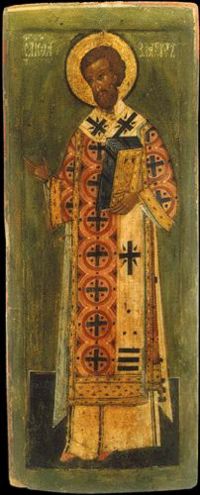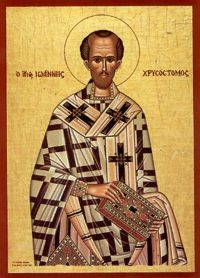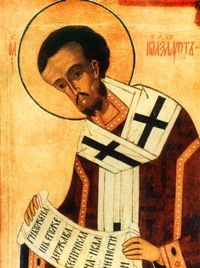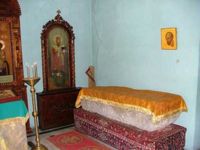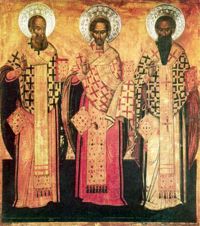Dr. Constantine Cavarnos on the Views of the Blessed Elder Philotheos
The problem that has been created in the Orthodox Church by the introduction of the New Calendar, known as the Gregorian Calendar (named after Pope Gregory XIII, who introduced it into the Latin Church in 1582), is one that worried the late Greek Elder, Blessed Philotheos (Zervakos), very much, from the time of its introduction into the Orthodox Church in 1924 until his death. He dwelt upon it in his publications and in his letters of counsel to those who were under his spiritual direction.[1] The New, Papal Calendar and Its Fruits [To Neon, Papikon Hemerologion kai hoi Karpoi Autou]—a 40-page pamphlet—is his most extensive treatment of this innovation. It was published at Thessaloniki by the periodical St. Nectarios. The date when it was published is not listed. From internal evidence, particularly the reference to an article by Archbishop Iakovos (of the Greek Orthodox Church of North and South America), which appeared on September 25, 1967, it is clear that it was published sometime after that date.
Two quotations at the beginning of the pamphlet serve as an introduction to what Father Philotheos has to say. The first, taken from the Seventh Holy Œcumenical Synod, states: "If someone sets aside any tradition [of the Church], written or unwritten, let him be anathema." The second, which is taken from St. Augustine, says: "Let there be no innovations, because innovations defile antiquity. For the Bridegroom and His Bride, the Church, are without blemish." The discussion of the Calendar innovation starts with an explanation of how it was introduced into the Church of Constantinople in 1924 by Patriarch Meletios Metaxakis and soon, the same year, by Archbishop Chrysostomos Papadopoulos of Athens. (Later, the New Calendar was adopted by the Patriarchates of Bulgaria, Rumania, and Alexandria. The Patriarchates of Jerusalem, Serbia, and Russia, the Archbishopric of Mount Sinai, and the Holy Mountain of Athos have avoided this innovation.)
The holy Elder states that when he learned that the New Calendar was going to be introduced into the Church of Greece, he wrote a letter to Archbishop Chrysostomos entreating him not to introduce the Papist Calendar, because this innovation would divide the Church into hostile parts. He remarked that "the Traditional, Old Calendar neither caused any harm to the Church in the past nor is causing any harm now, whereas the adoption of the New Calendar would banish peace from the Christian population of Greece, would cause divisions, confusion, malice, and turmoil" (pp. 4-5).
Chrysostomos, he says, did not heed this counsel and proceeded to introduce the New Calendar. The consequences were exactly those which Blessed Philotheos had foreseen. This prompted him to write a second letter to Chrysostomos, in which he said: "The fruits of the New Calendar which you introduced thoughtlessly, anticanonically, and unlawfully are the banishment of love and the generation of malice. It banished happiness and brought sorrow. It banished peace and brought division, disputes, quarrels, and warfare. Before, the Christians were united and you divided them. The Orthodox Church, which for twenty centuries was one, you divided into two: that of the Old Calendarists and that of the New Calendarists" (p. 6). Unfortunately, remarks the venerable Elder, Archbishop Chrysostomos Papadopoulos paid no attention to this letter, either.
From that time on, he goes on to say, there began the fruits of the New Calendar. "The first ones to reap these fruits," he observes, "were those who introduced it" (p. 7). He explains that the Patriarch of Constantinople Meletios Metaxakis was beaten by zealous Orthodox Christians of Constantinople and was forced to seek refuge in Greece.... After a time, he became Patriarch of Alexandria. Then he sought to become Patriarch of the more prestigious Patriarchate of Jerusalem. Having failed in this, he fell sick from sorrow. Tortured by disease and censured by his conscience, Meletios Metaxakis died saying: "I am suffering because I split the Church" (p. 7).
As far as Archbishop Chrysostomos is concerned, Father Philotheos informs the reader that this innovator was struck in the face and head with scissors as he stood at the Bishop’s Throne in a Church in the city of Piraeus. The man who struck him was a barber who wanted to humiliate him by shearing off his beard. Father Philotheos proceeds to describe in detail various other fruits of the New Calendar innovation: divisions, dissensions, quarrels, hatreds, various forms of going astray (pp. 8-31).
The Elder asserts that "the Old Calendarists did well in not accepting the Papist Calendar—which was introduced into the Orthodox Church anticanonically and unlawfully—and following the Traditional, Old Calendar, which was handed down to us by the Holy Fathers of the First Holy Œcumenical Synod" (p. 28).
Having described some of the evil fruits of the Calendar innovation, Father Philotheos proceeds to give advice as to what should be done in order to reunite the members of the Orthodox Church and put an end to the grievous dissensions and hatreds. As far as Greece is concerned, he says that the Holy Synod of the Church of Greece should meet and canonically and lawfully reject the New Calendar and introduce the Old, Traditional one. "If the government should object, let the government keep the New Calendar for its dealings and correspondence with other nations; while the Church ought to keep for itself the Old Calendar for its holy feasts" (p. 32). He adds that "if perchance some clergymen and laymen, who are philo-Papists or philo-Protestants, innovators and modernists, should oppose this, the Church should admonish them once or twice. If they do not repent but persist in their opposition, the Church should expel them as corrupt members" (p. 32).
Continuing, Father Philotheos adds that the rejection of the New Calendar and the restoration of the Traditional one is necessary not only in order to put an end to the division of the Church, to dissensions and hatreds, but also for the following reasons: a) because following the Old Calendar is a tradition of the Church, and those who reject it are subject to the anathema of the Seventh Holy Œcumenical Synod, which is quoted at the beginning of his treatise; and b) because the introduction of the New Calendar abolishes the Fast of the Holy Apostles, which is an old tradition of the Church: sometimes it abolishes this fast completely and sometimes reduces it to only one or two days. (Originally, this fast was a seven-day one, then it became longer.)
Finally, Blessed Philotheos notes that as a Church calendar the New Calendar has been condemned and anathematized by three Regional Synods (in 1583, 1587, and 1593). This pamphlet has the merit of putting the Calendar problem in proper perspective, dealing with its essential aspects in a brief, clear, incisive manner. New Calendarists think that the question is about thirteen days, about astronomical correctness, and view the Old Calendarists as simply stubborn, ignorant persons who are averse to scientific improvements. Father Philotheos makes no mention of "astronomical correctness" vs. "astronomical incorrectness," because this is not really the point at issue. What is at issue is whether Orthodox Christians should remain faithful to Tradition, or are free to innovate as they please, with a view to some political or other secular expediency, without regard to the Church’s canonical way of doing things and without regard to foreseeable evil consequences ("fruits") of their innovations for the Church.
It should be added that the New Calendar was introduced into the Orthodox Church not for the sake of astronomical correctness, but as the first step in achieving a forced, false union of the Orthodox Church with Unorthodox New Calendarist Christian bodies, for the sake of certain secular advantages which such a union was expected to have. This was to be the beginning of the Orthodox Church’s participation in the "Ecumenical Movement"—a movement which has further divided the Orthodox Church into mutually hostile parties: the Ecumenists and the anti-Ecumenists. All the Greek Old Calendarists are anti-Ecumenists, while some of the New Calendarists are Ecumenists and others are anti-Ecumenists. Thus, the evil fruits of the introduction of the New Calendar, which the Blessed Elder clearly foresaw, keep growing in number.








